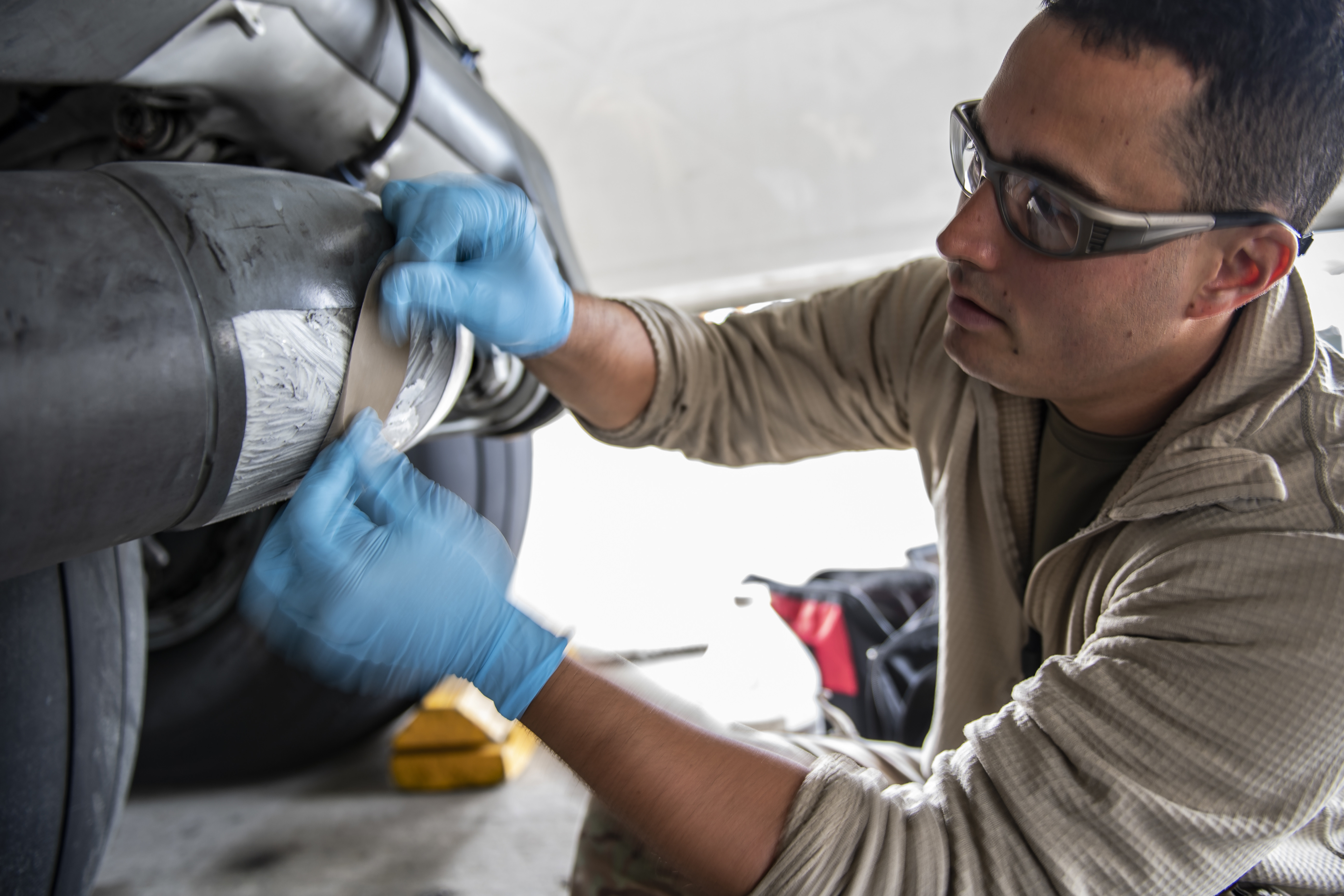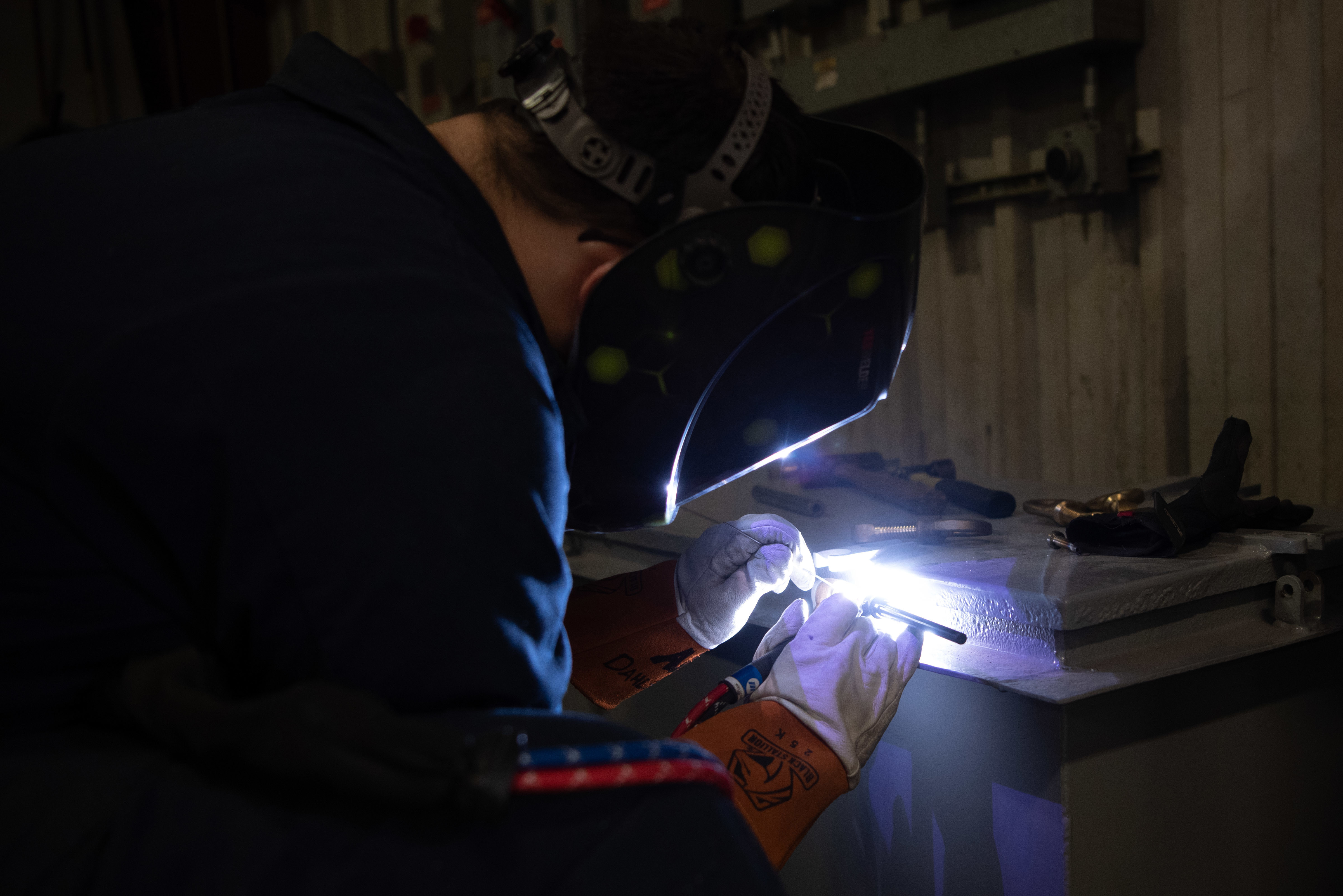 Staff Sgt. James Krobot, 911th Maintenance Squadron aircraft structural maintenance technician, sands down anti-chafing tape on a C-17 Globemaster III main landing gear assembly during a home station check inspection at the Pittsburgh International Airport Air Reserve Station, Pennsylvania, May 18, 2020. Airmen are performing the first ever HSC in Pittsburgh on the flightline due to the travel restrictions in place because of COVID-19 while the new hangar is still under contruction. (photo by Joshua J. Seybert)
Staff Sgt. James Krobot, 911th Maintenance Squadron aircraft structural maintenance technician, sands down anti-chafing tape on a C-17 Globemaster III main landing gear assembly during a home station check inspection at the Pittsburgh International Airport Air Reserve Station, Pennsylvania, May 18, 2020. Airmen are performing the first ever HSC in Pittsburgh on the flightline due to the travel restrictions in place because of COVID-19 while the new hangar is still under contruction. (photo by Joshua J. Seybert)
One of the biggest lessons learned during the COVID-19 pandemic is that the supply chain is vulnerable to offshore suppliers, particularly adversaries such as China, a senior Pentagon official said.
Ellen M. Lord, undersecretary of defense for acquisition and sustainment, spoke on defense spending and capabilities after COVID-19 at the Brookings Institution's European Union Defense Washington Forum today, participating in the discussion via video.
The United States and its allies and partners now have a better understanding of the fragility of the supply chain, Lord said. Critical military systems depend on rare-earth mineral processing and microelectronics made in China or fabricated and packaged there.
 200602-N-ZI768-1097NEWPORT NEWS, Va. (June 2, 2020) Aviation Structural Mechanic 3rd Class Andrew Dahlstrom, assigned to the aircraft intermediate maintenance department aboard the Nimitz-class aircraft carrier USS George Washington (CVN 73), welds a brass dog on a pyrotech junction box at George Washington’s Light Industrial Facility. George Washington is undergoing refueling complex overhaul (RCOH) at Newport News Shipyard. RCOH is a multi-year project performed only once during a carrier’s 50-year service life that includes refueling the ship’s two nuclear reactors, as well as significant repairs, upgrades, and modernization. (photo by Mass Communication Specialist Seaman Cory J. Daut)
200602-N-ZI768-1097NEWPORT NEWS, Va. (June 2, 2020) Aviation Structural Mechanic 3rd Class Andrew Dahlstrom, assigned to the aircraft intermediate maintenance department aboard the Nimitz-class aircraft carrier USS George Washington (CVN 73), welds a brass dog on a pyrotech junction box at George Washington’s Light Industrial Facility. George Washington is undergoing refueling complex overhaul (RCOH) at Newport News Shipyard. RCOH is a multi-year project performed only once during a carrier’s 50-year service life that includes refueling the ship’s two nuclear reactors, as well as significant repairs, upgrades, and modernization. (photo by Mass Communication Specialist Seaman Cory J. Daut)
In addition to the problems uncovered in the manufacturing of military components, adversarial capital is coming in that involves intellectual property theft, as well as merger and acquisition activity that involves takeovers of critical companies in the U.S. and its allied and partner nations, she said.
"We need to make sure we re-shore as much as possible," she said — bringing as much of the defense industrial base back to U.S. shores as is feasible while still relying on allies and partners for their contributions. Canadian, Mexican and European partners produce military hardware for the United States, she noted.
When the Defense Department goes out for bids for a system, the DOW officials like to have as many competitive bids as possible — both to bring down cost and to have more options, Lord said. If just two companies are bidding, she said, she'd prefer that one is domestic.
One of the most important aspects of the U.S. industrial base and the trans-Atlantic industrial base in Europe is frequent and transparent communications, Lord said. She noted that she's in constant communication with her European counterparts to bounce ideas off of them on reform and modernization, as well as issues of interoperability and countering malign Chinese influence.
"When we go to war, we go together," Lord said. "We need to be interoperable. Unless we're working on these systems together, we will not be interoperable."
Distributed by permission of DOW


